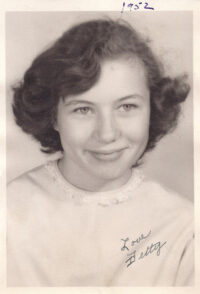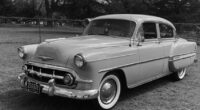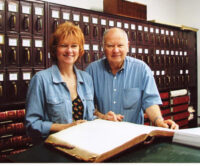1942 • Vallejo, California ~ The only dog the family ever had was when they lived in Vallejo, but they didn’t have him for long. It was a little black and white eight-year-old mongrel, and eight-year-old Larry loved him. On a cloudy Sunday, our parents took a drive out of town with Larry and Carleen cradling Betty in the back and Mom and Dad with the dog in the front; when they stopped, my parents quietly let the dog out. As they turned around to head back to town, Larry heard barking and swiveled his head, looking out the rear window.
“Hey, that looks like our dog. HEY!” he yelled, “that IS our dog.” Dad shifted gears; he and Mom stared straight ahead. In silent unison, they looked at the grey sky and reflected, “that was your dog.”

The most exciting thing that happened to Larry that year was when a huge military blimp broke loose from its wire anchors and landed in the front yard. A fleet of military trucks with soldiers from Mare Island came to get the blimp. Larry’s excitement turned to despair when an army truck ran over his favorite toy. His steel red wagon, a Radio Special, was crushed.
My brother was the experimenter in the family, always attempting to figure out how things worked. When he was seven he was playing with matches, carefully trying to burn the little balls off the white bedroom curtains in Mom and Dad’s room. The sheers instantly went up in flames. Larry didn’t know what to do so he tore down the charred remains and hid them in the closet. The wall was singed but luckily the house didn’t burn down. Dad was enraged and told his son he’d give him a strapping he’d never forget.
In March of 1942, when the family lived in Vallejo, Claudia, the sister closest to me in age, but who liked me the least, was born. Betty felt the same way about Claudia when she was born. Betty didn’t like her from the get-go, nor did she ever forgive her for coming into the world, especially when Claudia—with her blonde ringlets, long eyelashes, and cherubic face—became the favored child of the family.
Dad worked for Union Ice from 1936 to the summer of 1943—about the time the new electric refrigerators put an end to need for home ice deliveries. Electric refrigerators were built after WWII and the Union Ice Company made a desperate attempt to stay in business, advertising that ice was the perfect refrigeration for fresh products, better than the electrics which produced a dry coolness that wilted produce. Within a very few years, the local delivery of ice to individual households ended and the only delivery left was of ice cubes and crushed ice to bars and restaurants. That didn’t last long either. Ice-making machines came on the market, spelling doom for the Union Ice Company.
1943 • Sonora, California ~ In 1943, the family moved to Sonora, the county seat of Tuolumne County in the Sierra Nevada foothills, where Dad traded in his dark blue uniform for a suit and tie to manage the Sprouse Reitz on Washington Street. The former farmer, construction worker, iceman, and pinball wizard comfortably settled into small town life, running a five and dime and raising his growing family.
To be continued…
Catherine Sevenau is a writer, humorist, and storyteller living in Sonoma, California. The stories in this series are excerpts from her book, Through Any Given Door, a Family Memoir, available as a series at Sevenau.com. She is a longtime Broker/Realtor at CENTURY 21 Epic Wine Country. [email protected]





Be First to Comment